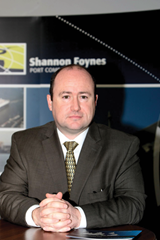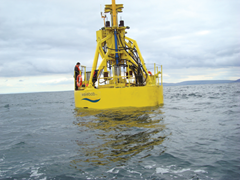Getting the technology right
 Wavebob CEO Andrew Parish discusses developing ocean wave energy technology with Owen McQuade.
Wavebob CEO Andrew Parish discusses developing ocean wave energy technology with Owen McQuade.
“Everyone has an opinion on ocean energy and everyone has a romantic view of the power of the waves,” according to Andrew Parish, who is Chief Executive of Irish wave power technology company Wavebob. However, “trying to get someone to cut a cheque when they know they are investing in high technology risk over a long term, is challenging,” he contends.
The ‘Wavebob’ is a floating buoy device that will automatically adjust its response to suit the prevailing wave climate, maximising the amount of useful power that may be delivered to the electricity grid onshore.
The company describes it as “an axi-symmetric, self-reacting point absorber, primarily operating in the heave mode. It is specifically designed to recover useful power from ocean wave energy, and to be deployed in large arrays offshore. It incorporates a number of innovative features and is protected by a series of patents that have been assigned to the company.”
In 2007, it was one of the first wave energy convertors in the world to successfully produce electricity from ocean swell.
Wavebob secured a $2.4 million grant from the US Department of Energy to develop and test their advanced power take-off device in September 2010. Vattenfall, one of Europe’s largest utility companies, has a 51 per cent stake in a joint venture between the two; Tonn Energy.
“One of the risks in this sector is that people start developing technology and then get caught up trying to develop sites and going through the planning, permitting and all those legal and environmental issues,” Parish tells eolas. “We’ve seen a number of companies who’ve devoted more time on that than getting their technology right, and [subsequently] their technology fails.”
As a result, Wavebob decided, early on, to focus on “getting the technology right.”
“We recognised that there are rapidly growing market opportunities and there are others who are better able to develop that utility model. So we’d do the technology and let others do the sites.”
However, the company wanted to understand how the process of developing utility models works and therefore it entered a joint venture with Vattenfall (Tonn Energy).
“That secured a commercial relationship with a key end-user. It allowed us access to the lessons learned of trying that development model here in Ireland,” Parish explains.
With offices in Maynooth, Belfast and Maryland, Wavebob is currently concentrating on targeting oil and gas companies and the US military, which “see a need for offshore independency in terms of energy production, for whatever reason.”
The US office was opened in 2008 and “while the market opportunity wasn’t as visible in the States then,” Parish recognised that there was a “very rich community of ocean energy experts, engineers and that whole marine environment that came out of association with the US Naval Academy”, allowing the company to tap into the expertise it is currently using.
Parish says there are two ways he could run the business. “We could build a huge team internally and raise a whole lot of capital and try to do classic technology company scaling strategy,” he suggests.
“Or we could try boxing clever, identifying our core strengths, the core competencies we need to build internally and then identify partners we can engage with.”
He chose the second option because the potential to raise capital is difficult. He states: “As long as we’ve surrounded ourselves with a number of strategic partners who had invested time and or money and are actually willing to walk the journey with us, that means our development costs are lower, our technology experience increases and we get greater expertise by tapping into people who’ve done this before.”
The traditional venture capital (VC) market is effectively closed to this sector, Parish believes.
As a number of companies have raised a lot of VC money on inflated business plans, Parish says: “There’s a reputation in the investment community that wave energy companies over-promise, under- deliver, fail or there’s no exit opportunity.”
He notes that there are no positive examples of companies which have brought in VC, have scaled their business, have gone through an IPO or trade sale and made the investors happy.
“It’s seen as a bit of a money sink,” he says of ocean energy technology, but Wavebob is “trying to change that.”
 He cites an example of a solar photovoltaic company that can produce technology and sell it through a customer as a demonstration sale for approximately $70. However, for Wavebob to demonstrate its technology to potential customers, the cost would be $3-5 million.
He cites an example of a solar photovoltaic company that can produce technology and sell it through a customer as a demonstration sale for approximately $70. However, for Wavebob to demonstrate its technology to potential customers, the cost would be $3-5 million.
“If you’re an energy investor, where are you going to put your money?” Parish asks.
However, “there’s a very small group of people who are willing to invest and see the huge upside associated with this massive market opportunity.”
Parish has been moving closer to corporate investor, family office and foundation money sources “that are looking to invest over time.”
Future challenges
The profile of ocean energy “is a challenge in itself [because] with profile comes expectation,” he contends.
“The reality is this isn’t going to happen in the timeframe or to the extent that many people think”, therefore there is a widespread view that there is no money to be made.
In an Irish context, there is “inertia in the public sector in terms of moving water licensing”, which must be progressed, Parish says.
Ensuring that his business remains viable and can grow is another challenge which would be eradicated if he could raise more capital.
“We are a small start-up company, we are broke half the time and we are stretching our creditors and paying ourselves less than we should; all the things that normal start-ups go through.”
Remaining “visible” is a further challenge. Parish adds that “being lauded as a shiny example of what can be done doesn’t actually reflect the reality [of] blood, sweat and tears and hanging on by your bleeding fingernails whilst trying to get technology to a point where we’ve retired the risks, articulated a business plan and engineering strategy that’s in line with customers’ expectations and we are funded to deliver on it.”
Overall, the biggest challenge is securing funding in the economic downturn.
Looking forward, “it’s going to be finance first, proving the technology within a reasonable period of time and ensuring that its safe and environmentally aware.”
Parish believes that it is important that “we don’t get more and more companies trying to do this on a shoe string, taking shortcuts, causing accidents or reinforcing the message that this is un- investible.”
Relationships with the US must be built upon and ongoing discussions about potential memorandums of understanding between Ireland and the US around ocean energy and are “very positive.”
Despite these problems, “it’s
been very rewarding,” Parish concedes.
In terms of market sectors, while the classical utility market – “where you’re building a wave farm and bringing 50-100 MW into the national grid” – is the one that in will generate the most revenue in the long term, it will not happen for a longer period of time due to the cost of putting down the cables and “maturing technology so that you can deploy [energy] by the hundred.”
The oil and gas sector will move quicker, Parish states. In addition, there are opportunities because that sector has “very considerable budgets.”
The US military also has significant budgets and “some of the planning and legislative issues that cause projects to be delayed [in Ireland]” can be bypassed in the US.
“My view is that we are going to see some earlier opportunities in that space and that will help develop the technology to enable it to scale for the utility markets,” Parish concludes.
Andrew Parish is CEO of Wavebob Ltd. He holds a primary degree in mathematics and chemistry from the National University of Ireland and holds postgraduate management qualifications from Henley Business School and the Irish Management Institute. Andrew is an entrepreneur, having founded Applied Innovation Ireland, IP Activation Group and Tonn Energy, and has provided consultancy services to both the public and private sectors in areas such as business and innovation strategy, applied research, energy and climate change policy. He serves on the boards of the School of Engineering in Trinity College Dublin; the Business Advisory Group of Georgia Tech Ireland, and the Research Advisory Council of the University of Limerick.
He enjoys music and photography and is a rally fan.





